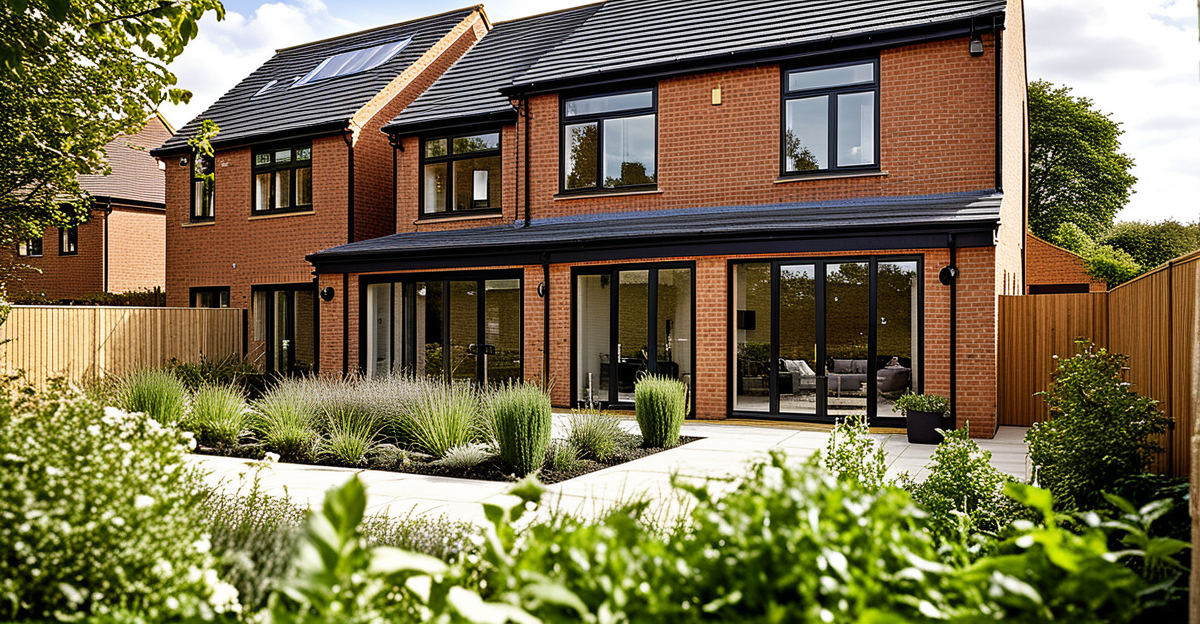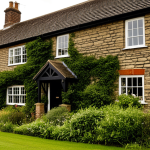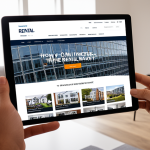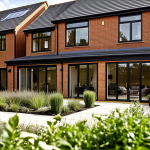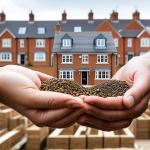Overview of Sustainable Real Estate Investment in the UK
Sustainable real estate investment has emerged as a crucial aspect of the property market in the UK, driven by an increasing focus on environmentally sustainable practices. At its core, sustainable real estate aims to minimize the environmental impact of structures by incorporating energy-efficient designs, reducing carbon footprints, and utilizing sustainable construction materials. The key principles involve conservation of resources, reducing waste, and creating healthier environments for inhabitants.
The UK market trends highlight a growing demand for sustainable real estate, reflecting a shift in investor interests towards properties that promise both eco-friendliness and economic viability. The market has witnessed significant growth in sustainable investments, with recent statistics indicating a robust increase in projects specifically focused on sustainability. For example, there has been a notable rise in the development of energy-efficient residential spaces and commercial buildings designed to adhere to the highest sustainability standards.
Additional reading : How can investors capitalize on the UK rental market?
Investment growth is expected to continue as both individual and institutional investors recognize the long-term value offered by sustainable real estate. The push for sustainability is not just about meeting regulatory requirements but also about leveraging market trends that favor environmentally responsible and innovative real estate solutions. As a result, the UK property market is increasingly populated with sustainable projects that not only benefit the environment but also enhance the financial portfolio of investors aiming for resilience against future economic fluctuations.
Driving Factors Behind the Popularity
In recent years, the appeal of sustainable real estate investments has surged, primarily driven by several key factors that influence investor decisions. First and foremost, there is a marked increase in public awareness regarding environmental sustainability. This shift in consciousness stems from a growing understanding of climate change and its impact, pushing both individuals and organisations to seek more environmentally responsible choices.
Additional reading : What are the best strategies for financing UK property developments?
Furthermore, government policies and regulations play a significant role in promoting sustainable practices within the real estate sector. The UK government has implemented numerous initiatives aimed at reducing carbon emissions and enhancing energy efficiency, which in turn incentivises the development and adoption of sustainable projects. These policies not only encourage compliance but also support investors through financial incentives and supportive regulatory frameworks.
Additionally, the influence of global sustainability trends has shaped local investment preferences. With international agreements such as the Paris Agreement, the emphasis on sustainability has permeated global markets, encouraging the UK property market to align with these ideals. This intersection of awareness, policy, and global alignment creates a fertile ground for sustainable real estate investments to thrive, drawing increased interest from investors keen on aligning with future-oriented and responsible practices.
Benefits of Sustainable Real Estate Investment
The benefits of sustainability in real estate investment are manifold, offering distinct financial advantages compared to traditional property ventures. One of the leading benefits is the prospect of higher long-term returns. Sustainable real estate commonly boasts increased energy efficiency, resulting in significantly lower operational costs over time. This efficiency not only minimises expenses but also enhances the property’s market value, attracting more investor interest as these savings compound over the years.
In addition to cost savings, sustainable investments can lead to enhanced financial performance through government incentives. The UK government, for example, often provides tax breaks and subsidies to developers who meet specific sustainability criteria, thereby increasing the net gains for investors. These incentives act as compelling motivators for investors to consider environmentally responsible options.
Furthermore, sustainable properties tend to exhibit greater resilience in fluctuating markets. The growing consumer demand for eco-conscious living spaces increases the appeal of these properties, ensuring robust property value retention. This makes sustainable real estate a prudent choice for investors seeking to bolster their portfolios against potential economic downturns. Overall, the cumulative effect of energy savings, government support, and market appeal positions sustainable real estate as a lucrative, forward-thinking investment strategy.
Consumer Preferences and Market Shifts
The way consumers perceive real estate is undergoing a significant transformation, largely propelled by a growing preference for sustainable living. An increasingly eco-conscious consumer base now prioritises environmental responsibility, influencing how properties are developed and marketed. This shift is particularly evident among millennials and Gen Z, who are driving current market trends with a strong emphasis on sustainability.
Millennials and Gen Z exhibit a profound interest in properties that align with their values of sustainability and community-focused living. Their demand for environmentally friendly and energy-efficient homes has catalysed changes within the real estate sector, compelling developers to incorporate sustainable practices into their projects. This demographic shift indicates a broader trend towards sustainability preferences, as more individuals opt for homes that offer both eco-efficiency and modern conveniences.
A variety of case studies illustrate the successful integration of sustainable ideals into real estate. Developments like Bristol’s Harbourside and Birmingham’s Paradise offer excellent examples, where sustainable construction methods have been seamlessly combined with aesthetically pleasing, practical designs. These projects have garnered widespread acclaim, serving as beacons of the market demand for sustainability-oriented real estate solutions. As consumer awareness continues to evolve, so will the pressure on developers to innovate and adapt to the changing landscape, keeping sustainability preferences at the forefront of their strategic priorities.
Government Policies and Incentives
Government policies and investment incentives play a crucial role in fostering the growth of sustainable real estate across the UK. These measures help market stakeholders meet environmental targets while promoting economic viability.
UK government policies such as the Green Homes Grant and specific tax reliefs have incentivised both developers and investors to prioritise sustainable practices. These initiatives aim to reduce carbon footprints, drive energy performance improvements, and encourage the adoption of eco-friendly construction materials.
In terms of investment incentives, financial support is available in various forms, including grants, rebates, and subsidies. These incentives not only reduce the cost burden for adopting sustainable solutions but also make eco-friendly investments more attractive compared to traditional real estate investments.
The regulatory frameworks in place further cement sustainability as a priority. These frameworks ensure that projects adhere to stringent environmental standards, providing guidelines for sustainable development. By promoting energy-efficient designs and sustainable construction practices, these regulations aim to encourage the creation of properties that have a lower environmental impact and increased longevity.
This holistic approach, combining government initiatives and incentives with regulations, is designed to foster an environment where sustainable real estate can flourish, offering benefits both to investors and the broader community.
Case Studies in Sustainable Real Estate
Exploring successful sustainable real estate projects provides valuable insights into the practical application of sustainable practices and the impact these ventures have on the market.
Notable UK Projects
In the UK, some sustainable real estate projects have set new standards in eco-friendly construction. Bristol’s Harbourside is a prime example, where sustainable construction methods are integrated with aesthetically pleasing designs. This development showcases energy-efficient buildings and public spaces that encourage sustainable living. Birmingham’s Paradise has also made waves with its commitment to eco-efficiency and community-centric design. These projects demonstrate how sustainability can enhance urban livability while meeting the demand for green spaces.
Lessons from International Examples
Internationally, sustainable real estate projects provide crucial benchmarks for the UK market. For example, Freiburg’s Vauban Quarter in Germany stands out for its nearly car-free environment and emphasis on renewable energy sources. Another significant project is BedZED in the UK, which demonstrates how sustainable technologies can achieve zero carbon footprints. Both of these examples offer lessons in balancing urban planning with sustainability, showcasing potential pathways for future UK initiatives.
Innovative Approaches and Technologies
The success of sustainable real estate projects often hinges on implementing innovative technologies and approaches. Utilizing solar panels and green roofs not only minimizes energy consumption but also enhances the environmental quality of urban areas. Smart home technologies are increasingly being integrated into real estate developments to optimize energy use and provide residents with greater control over their living environment. By adopting these technologies, real estate developers can align with market trends and cater to an eco-conscious consumer base.
Future Trends in Sustainable Real Estate Investment
The future of real estate in the UK is poised for dynamic evolution, with sustainability innovations taking center stage. Predictions indicate a continued surge in sustainable investment trends, driven by technological advancements and shifting consumer expectations.
As we look forward, emerging technologies such as smart home systems and renewable energy solutions are expected to reshape the landscape of sustainable real estate. These advancements promise enhanced energy efficiency and resource management, offering investors new opportunities to maximize returns while meeting sustainability goals. Moreover, the integration of green building technologies is likely to extend beyond energy efficiency, focusing on holistic environmental impacts and improving occupants’ well-being.
However, prospective investors should be mindful of potential challenges. As the market grows, navigating the complexities of regulatory compliance and ensuring the viability of sustainable projects might pose significant hurdles. Yet, these challenges also present opportunities. By staying informed about evolving market conditions and investing in forward-thinking solutions, stakeholders can tap into the burgeoning demand for greener housing.
In conclusion, the real estate sector’s shift towards sustainability reflects a broader investment trend driven by innovation and ecological consciousness. Industry players who embrace these changes stand to benefit from both the imminent challenges and the promising opportunities that sustainable real estate investment offers.

